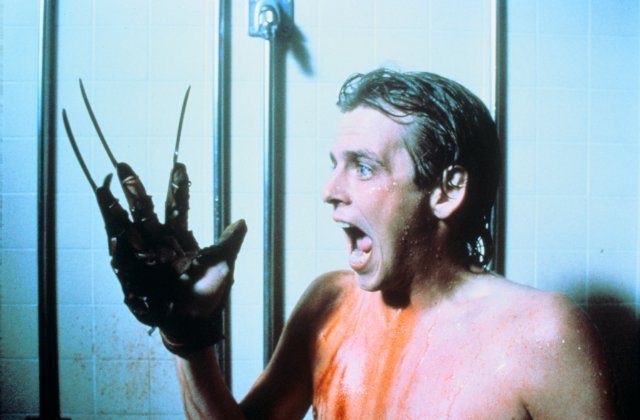
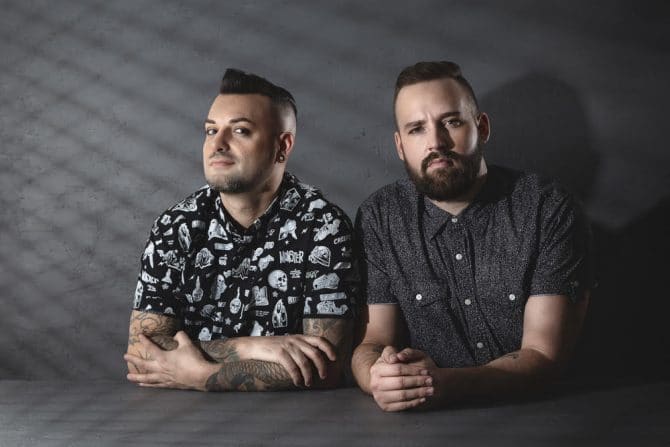 Tyler Jensen and Roman Chiminenti. Photo by Joe Kramm
Tyler Jensen and Roman Chiminenti. Photo by Joe Kramm
A Nightmare on Elm Street 2: Freddy’s Revenge is sometimes ranked as the gayest horror movie of all time.
For Roman Chiminenti and Tyler Jensen, that’s a good thing.
The two horror fans have long treasured the movie for its queer elements, even while the mainstream horror world attacked it for its homoerotic subtext. The plot features a number of queer themes, sometimes overtly so: characters visit a gay leather bar, two male friends decide to spend the night together because they’re scared, and the main character, Jessie, talks about dark impulses trying to take over his body. When it premiered in 1985, the film’s reception spelled doom for the career of up-and-coming actor Mark Patton, who became uncastable as a result. Worse, Patton–a gay man in real life–found himself the subject of tabloid gossip and harassment over his sexuality. Diagnosed with HIV, he eventually left Hollywood and disappeared into seclusion in Mexico.
Now Chiminenti and Jensen are telling Patton’s real-life showbiz horror story while dissecting the origins of the queer subtext in Freddy’s Revenge. Their new documentary Scream Queen: My Nightmare on Elm Street brings Patton back to the spotlight, provides context to the growing reputation of Nightmare 2 as the gayest horror movie ever.
By turns intriguing and horrific, the film presents the fall and rise of Freddy’s Revenge and Mark Patton, both victims of homophobia, and both unique in horror history.
Queerty snagged time with Jensen & Chiminenti just ahead of the premiere of Scream Queen at Frameline, the San Francisco-based queer media arts foundation. The film plays Frameline43 on June 29, and at Outfest July 20 & 21.
Roman Chiminenti: I think it started with me. I saw [Freddy’s Revenge] when it came out. I always loved it. For me, it was always kind of weird that I was into horror movies. Gay people weren’t like, outwardly, out of the horror closet in the 80s. So I was a weirdo. And I’ve always loved Elm Street 2. I never understood why people hated it. When Never Sleep Again (the exhaustive documentary on the Nightmare on Elm Street franchise, which finally acknowledged the gay subtext of Elm Street 2) happened, I thought it was kind of cool that it was coming back in the limelight. But I also thought it felt like a gay joke all over again. It didn’t feel right to me. And out of the blue one night, I was like whatever happened to Mark Patton? And I looked him up, and everything just exploded from there. I wrote to him, and we just started talking about the project.
I met Tyler working on a project. I’m a sound engineer.
Tyler Jensen: And I’m an editor. I was working on gay dating reality show and we were editing in the producer’s home. And I overhear Roman talking to him about this project about Mark Patton and Nightmare on Elm Street 2. Without joining the conversation, I just rolled up my sleeve and showed him my Freddy Kruger tattoo. I was like, I am going to be part of it. I first volunteered as an editor about two weeks before the first shoot. We shot a few days in Florida at a convention that was a big cast reunion. After that whole whirlwind experience, we shot Mark’s first interview in his hotel room. That’s where I first heard his whole story. That’s when the lightbulb went off in my head. I knew what the movie was, and what to do. So I brought it up to Roman: “I know what to do with this. You need to let me help you construct this.”
RC: It was a build as we go sort of thing. We didn’t know what we were going to end up with.
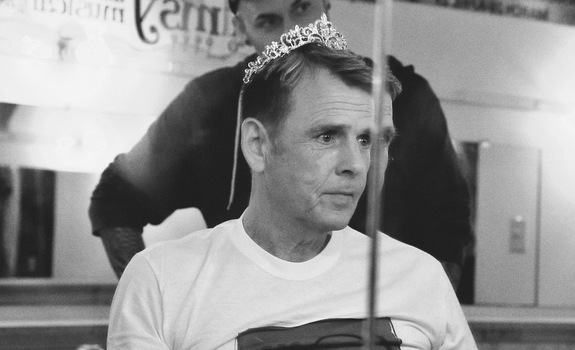 Mark Patton in ‘Scream Queen’
Mark Patton in ‘Scream Queen’
RC: He was actually easy to get in touch with because he was very present on social media. He had come forth already, and he had something in the works. It was a very different sort of thing; they weren’t quite sure how to tell this whole story. So I wrote to him, and I guess just through credentials he seemed comfortable talking to me. So he was very open about this. He was guarded because he wasn’t the best way to tell the story. He had offers that just wanted to make an Elm Street documentary. Everyone was just interested in the Freddy Kruger aspect. It was hard to find someone that really grasped the gay aspect.
So I drove down to Maryland to see him at a screening. We all went out after and spoke for hours about the concept behind it. We realized the direction it needed. He’s actually an extremely open individual. Before I met him, he was on the cover of HIV+. He’s been very vocal, so I give him a lot of credit.
TJ: The most harrowing part is the personal story. The AIDS epidemic. I’m a generation behind Mark, I was getting first-hand knowledge from him. I had to do my history, do my research and get up to speed. In terms of what they can’t tell you in textbooks and film clips, is the emotional impact of that trauma. For some people, it’s locked in a box in their brain, and nobody wants to open that again. I wanted to hear the really personal stuff. It was an intense amount of grief that I hadn’t figured out for myself yet. I hope to tell that story to the next generation. It’s grief that’s unfathomable.
RC: It was very difficult. I thought I knew the story, but you take for granted the fact that he’s very open about it. So when you see someone start to unpack it all, and there were many times in interviews where we’d go in thinking it was a controlled situation, and then the conversation drops to this other place, and the emotions swell. I’m a generation behind Mark, and Tyler’s a generation behind me. So I was more aware of the baggage the gay community carries. That was also my underlying message: we have some things to unpack if we want to be an alliance. But it’s hard.
TJ: In the same way we recognized the weight of it was what was propelling us forward. There were lots of difficulties putting all this together, but deep down, we knew what we were doing was impactful.
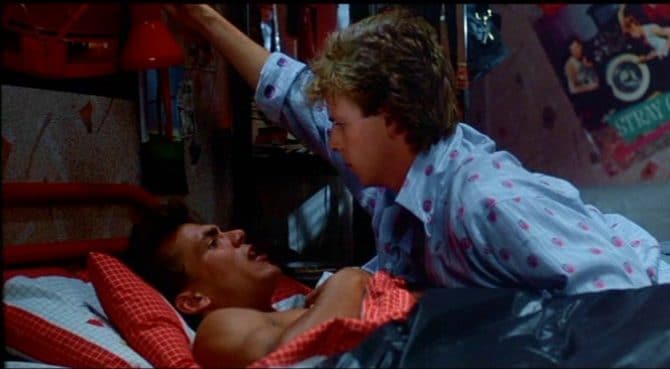 Robert Rustler & Mark Patton in Nightmare on Elm Street 2: Freddy’s Revenge
Robert Rustler & Mark Patton in Nightmare on Elm Street 2: Freddy’s Revenge
RC: It does seem rather ambitious, doesn’t it? That seems like the kind of seasoned direction that an experienced writer might do. I don’t think he was experienced enough for that. It’s hard to say. The way I look at it—obviously, we’ve thought a lot about this—where we are now, and where [Chaskin] is now—he’s an ally. What was the intent? To hurt? To harm? Or just be colorful? Having talked to him, I don’t think he had ill will. I don’t think there was a homophobic intent. It might have been reckless, but I don’t think it was homophobic. I only know where he stands now. He’s in line with a lot of the trauma that has happened to the gay community in a sense, in that he didn’t have the personality to know the pool he was swimming in. Maybe he’s said stuff to make his work seem better. I don’t know. But he seems to be in a good place now in terms of understanding Mark’s journey.
TJ: We were talking with [director] Jack Sholder about it. He seemed pretty clueless. I think at the end of the day, the public opinion about this movie is that it’s gay. It is a very queer story. I read it as such. It’s a fear that gay people understand: that internal reckoning moment where you realize you’re not straight or “not normal.” Not everyone handles that swimmingly at first. But as queer people watching this movie, we all identify what’s happening to Jessie in this movie. This movie is a Trojan Horse in that gay kids and straight kids growing up, having sleepover horror movie parties, everyone watches Nightmare on Elm Street movies. And they gay kids are noticing Part 2 as having all this erotic imagery to it. They appreciate it a little more.
TJ: Oh my God. We had a lot of awesome tension there. We had driven up with Mark and we decided we were going to interview David first before they met each other. So while we’re in David’s home, Mark is in the car outside. In the middle of winter. With no heat. Getting agitated. And there was a hail storm during David’s interview, so we had to stop and let it pass. He talked for two and a half hours. So Mark’s in the car for almost three when we finally came to get him. And he’s been brewing this fight in his head for 30 years. So tensions were high.
We finally got to this high tension moment, and one of the cameras ran out of film.
TJ: It was right after he said the most incendiary thing in the interview, and we had to tell everyone to stop while we changed memory cards. There was this unbelievable three minutes of stone cold silence.
[Laugher]
But we definitely left on good terms.
RC: There was a moment where Mark had walked in the room, and David’s visible awkwardness and fear started having an effect on him. So they were just kind of vibrating off each other. It actually got more combative than you see; we had to keep it tight to get to the point. They had a very long, uncomfortable conversation, but in the end, relief just filled the room. It was emotional for everybody.
[Laughter]
RC: We’re thinking about it.
RC: Yeah, in the context of being able to—for Mark, anyway—confronting it, unpacking it and seeing clearly what the problem was. So absolutely. That conversation alone allowed him to put so many feeling in perspective.
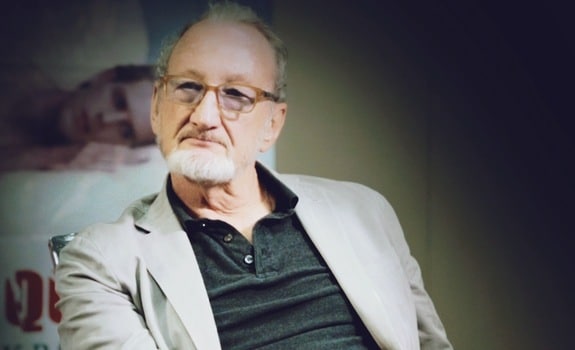 Freddy Kruger actor Robert Englund in ‘Scream Queen’
Freddy Kruger actor Robert Englund in ‘Scream Queen’
RC: Absolutely. Now he’s able to appreciate being able to come and meet his fans and talk about horror without feeling like he needs to defend something. He can celebrate it. Up until now, he’d come and meet people and enjoy it, but there would still be an element of you’re not fully accepted.
TJ: I don’t know if he’ll get back into acting full time. But definitely, him coming to conventions and interacting with fans gives him a lot of joy. I’ve seen it first hand. I’d never been to a horror convention until I started this project. To see him interacting with people with these emotional stories, this movie gave them a window out of it. Sometimes it doesn’t matter that Nightmare on Elm Street 2 wasn’t the greatest movie of all time. It was accessible to people who needed it. They found comfort in that. That is his greatest gift: that he can connect with all these people who were going through hard times, and give them hope.
RC: Absolutely.
TJ: That’s an easier sell with women characters. We’re always attracted to heroes that are vulnerable, that could fall off the wire at any moment, but they survive in the end. They were setting up Jesse’s character to do that. In the final act of the movie they push Kim into that role because it’s more conventional. And she does save the day in the end. A lot of times in horror, women are written androgynous to be more masculine in the end. That’s how we read Ripley [from Alien]. That’s how we read Laurie Strode [from Halloween]. Nancy Thompson [from the first Nightmare on Elm Street] for sure. I feel like she’s the first heroine to be proactive in her survival. She has a plan. She’s going to save everybody. I feel like that’s very empowering.
RC: I kind of feel also that this is a bit exclusive to the horror genre. Just in the 80s alone we had so many teen movies that featured nerdy teenage boys—everything from Say Anything to Pretty in Pink. And they always came out looking great in the end. It’s just that in the horror realm you deal with fear. That’s the side of masculinity that we have trouble with. In this case, I remember watching Part 2 and it was scarier to me because I could identify with Jessie’s character. And through this movie, I’ve met a lot of heterosexual guys that were like that’s me too.
So, on the one hand, I definitely think it’s symbolic of our community, but on the other hand, it shouldn’t be exclusively queer.
TJ: Mark is the first scream queen, and there hasn’t been another one because whenever you see a guy scream in a movie, it’s played for comedy. It gets a chuckle from people in the audience because they’re not used to seeing men frightened.
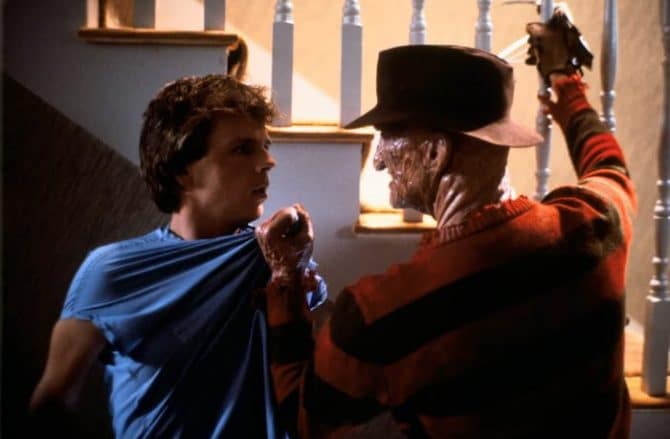 Patton & Englund in A Nightmare on Elm Steet 2: Freddy’s Revenge
Patton & Englund in A Nightmare on Elm Steet 2: Freddy’s Revenge
TJ: That really iconic shot of Mark in the shower holding up the glove—once his scream was out there in public, the jig was up. He was no longer a viable leading man.
TJ: It’s weird to think of TMZ culture now just outing everyone and airing their dirty laundry. When people were sick and dying and just trying to have a dignified existence, to add that on top of everything else is monstrous.
RC: Hmm. Well, when we started this process, everybody hated this movie. The people that didn’t like it for the reasons you are talking about. Ultimately, the majority of people didn’t like it [when it came out], but couldn’t articulate why. They could only call Mark “a fag.” Now it’s hard to find those comments or even that outlook. I think you might be right on some level. I think [the queer elements] have given it new life. That’s why people appreciate it.
TJ: I think the queer element is definitely the driving force as to why people are rediscovering it. If it wasn’t a sequel, if it was its own possession movie, it would be really good. It would be really interesting. [Nightmare 2] is similar to Prom Night 2 in that that film has even more overt lesbian subtext. If these two movies were sequels to each other, they’d be great.
Scream Queen plays at Frameline43 on June 29 and at Outfest on July 20 & 21.







